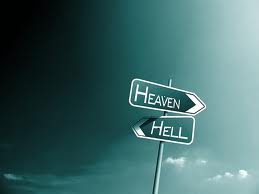
There is quite a stir about Rob Bell’s soon to be released book – Love Wins. It is about heaven, hell, and the fate of every person who has ever lived.
Judging by the response to a book that no one has even read yet, Bell has certainly hit a nerve. This nerve is probably the growing tension between traditional, orthodox Christian belief and the growing pluralistic, post –Christian culture we find ourselves in.
Is orthodox Christianity in danger? Is Rob Bell, and other church leaders, starting to teach false doctrines? Is the church succumbing to the post –modern culture it now finds itself in?
Or, are we now asking tough questions we once avoided? Are we not settling for cookie –cutter answers? Are we beginning to see things about God and scripture that we once were blinded to?
I reckon probably a little of both.
Here are some of my thoughts off the top of my head on the issue of heaven/hell:
1. The Conversation Changes When It is Someone You Love – and that is a good thing. Last year I lost my cousin to a tragic death. She was 25. That experience changes everything – and it should. Heaven and hell are not primarily matters of belief and doctrine. They are primarily matters of an intimate relationship with the living God.
I am not saying that we can change the Christian faith to suit our own feelings. I am saying that we can turn a living, breathing faith into a lifeless belief system. I worry that this issue has been thoroughly depersonalized by some church leaders. If that is true, we are in danger of being modern –day Pharisees. And Pharisees, in scripture, were orthodox in belief – but rebuked by Jesus.
2. Our Salvation is Based on the Grace of God. A young evangelist was sharing the gospel with people in an airport terminal. He noticed a man sleeping. Undeterred by his slumber, the young evangelist tapped him on the shoulder and asked, “Are you saved?” The man, half asleep, responded “Ummm, yeah, I’m saved. I suppose I’m saved. Yeah, I’m saved.” And then he went back to sleep.
The young evangelist did not think that was good enough, so persisted, “When, sir? When were you saved?” To which the man responded, “Well, I dunno. It was about 2,000 years ago I guess.” That is good theology. Our salvation is based on the grace of God.
When we discover that grace, and how we respond to it, will vary.
3. Judgment Resonates with our Souls. I don’t buy the argument that a God who punishes us is amoral or mean. Judgment resonates with our soul. Our hearts long for it. Our hearts ache for justice, including judgment.
For example, if a priest molests children. And continues to do so for years. And when caught, denies any wrong doing. And hides behind the power of his position and the church. And in the end, continues to serve as a priest and work with children. That disturbs our souls… especially those people who are not “religious”. Regardless of faith, judgment resonates with our soul. We want God to set things right.
God judges us. And while that is incredibly terrifying – it is a good thing.
Now, does telling a white lie equal burning in hell for eternity?
4. God’s Love and Grace is Always an Extravagant Surprise. In terms of hell -bound people, Jesus was notorious for keeping their company. It seems that in the gospels, religious leaders were quick to pick up rocks. But Jesus miraculously found a way to get them to fall to the ground harmlessly.
Tax –collectors, crooks, lepers, prostitutes, Samaritans, the demon possessed, and the other hell –bound characters in the gospels are exactly the type of people we read about in order to learn about God’s love and grace. According to the religious culture of their day, these were the people smitten and rejected by God. And that is exactly why Jesus was such a surprise.
5. Our Choices Matter. I cannot emphasize this enough – OUR CHOICES MATTER. One of the reasons hell leaves such a distasteful flavor in our mouth is because it asserts that there are actually consequences for our actions. And in our culture, we work very hard at being able to make POOR choices and then avoid living with the consequences.
Here is what I notice:
– Kids can make poor choices in school – should flunk or get punished – and are often passed on to the next grade.
– We eat poor food and get sick because of it – but we avoid changing our eating habits by taking pills or having surgery.
– We spend our money poorly. We buy things we cannot afford with money we do not have. And then we avoid the consequences by paying the minimum on our credit card or not answering our phone when the debt collector calls.
However, eventually all of these things catch up with us. Consequences are inevitable. Kids will grow up and have to deal with their lack of education. People get sick and have to deal with their illness. And eventually the debt collectors find you and make you pay.
Our choices matter. And that goes for God too. If we choose to reject God and his will, that matters. That is a significant decision. And I believe it has consequences.
My question is: if we spend our entire lives avoiding and rejecting God, what makes us think that will change on the other side of death?
6. Heaven and Hell are present realities. One of the biggest problems with this conversation is that we limit the idea of heaven and hell to “places we go after we die.” While I believe that this is partially true, the greater truth is that heaven and hell are present realities.
Hell is when/where God’s will is rejected. Heaven is when/where God’s will is done. One day, I believe, God will completely set the world right. All the evil, pain, and death (hell) will be eternally condemned. And the will of God will reign, and the glory of God will cover the earth like the waters cover the sea.
But in the meantime, heaven and hell are present realities held in tension. At times, God’s will is accomplished. At times, God’s will is rejected. At times, it is almost as if we are experiencing heaven on earth. At times, it is almost as if we are in the middle of a living hell.
7. The Human Soul is Eternal. So the bigger question is – are we becoming heavenly creatures (people who are living in God’s will), or hellish creatures (people who are rejecting God’s will)???
Both now, and forever, are we going to be people who live in harmony with the will of God? Or are we going to be people who reject the will of God (in favor of our own will)?
C.S. Lewis says, “Hell is when God finally says, ‘Your will be done.’
Which makes heaven, I guess, when we say with Jesus, “Not my will, but yours be done.”
This would be a good opportunity to re –read *Revelation 20: 11 – 22:21* with fresh eyes. Pay special attention to:
o Revelation 20:12 -15
o Revelation 21: 1 -8, 22 -27
o Revelation 22: 14 -15
Thoughts/insights?
